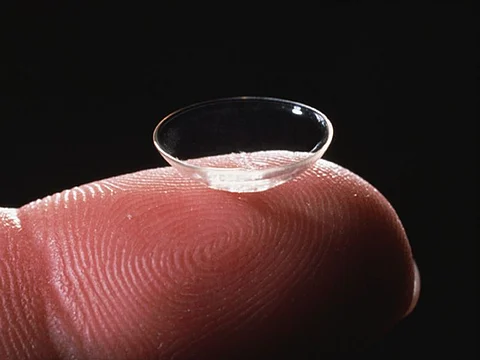THURSDAY, Aug. 16, 2018 (HealthDay News) -- A 59-year-old man was in the shower, wiping his eyes with a towel, when he heard a popping sound and felt pain shoot through his left eye.
His cornea had developed a severe ulcer and ruptured, tearing a hole in his eye.
The ulcer grew from a bacterial infection the man developed after leaving his soft contact lenses in overnight during a two-day hunting trip, according to a U.S. Centers for Disease Control and Prevention case report.
About one in every three people who wear contact lenses sleep or nap with their lenses still in, the CDC says.
These folks are risking their eyesight.
Sleeping in contacts increases your risk of a serious eye infection six- to eight-fold, the CDC warns.
"I've been telling patients not to sleep in contacts since the days when they told you that you can sleep in them. It's bad news," said Dr. Mark Fromer, an ophthalmologist with Lenox Hill Hospital in New York City.
Emergency surgery to replace the cornea saved the 59-year-old's eye. He eventually recovered useful vision, but only after undergoing cataract surgery a year later.
Sleeping in contacts creates perfect conditions for a bacterial eye infection, Fromer said.
"When you close your eyes, you're creating a situation where you have less oxygen," he explained. "The contact lens has the ability to trap bacteria right on the surface of your cornea. You have a plastic lens sitting on your eye the entire night, maybe seven or eight hours, creating a place for bacteria to grow."
In the Aug. 17 issue of the Morbidity and Mortality Weekly Report, the CDC shares six case studies of people whose eyesight was endangered by leaving their contacts in overnight.
In one case, a 17-year-old girl lost most of the sight in her right eye after sleeping in a soft contact lens purchased without a prescription at a chain store. The infection caused a corneal ulcer that left scars.
A corneal ulcer is an open sore on the cornea, the clear, dome-shaped film that covers the front of your eye, according to the American Academy of Ophthalmology (AAO).
These ulcers can badly and permanently damage vision, potentially causing blindness if they aren't treated, the AAO says.
"They are sight-threatening and they are painful," Fromer said of these ulcers. "They can cause a perforation of the cornea or very significant scarring to your cornea."
In another case study cited by the CDC, a 57-year-old man developed infections in both eyes after wearing the same soft contact lenses continuously for about two weeks. He didn't disinfect his lenses daily and slept in them regularly. Vision in both eyes was affected: He needed a corneal transplant to save his right eye, and his left eye was scarred.
Even decorative contacts -- ones that change the look of the eye but might not correct vision -- can do damage. An 18-year-old developed an ulcer in his right eye after sleeping in decorative soft contacts bought at a local store, according to the CDC report. His vision eventually improved in both eyes, but his left cornea remains scarred.
Fromer said he draws a hard line with patients about sleeping in their contacts.
"I have zero patients sleeping in them, and if my patients are sleeping in their contact lenses when they come into my office, I get them out of that habit right away," he said.
More information
The American Academy of Ophthalmology has more about corneal ulcers.



